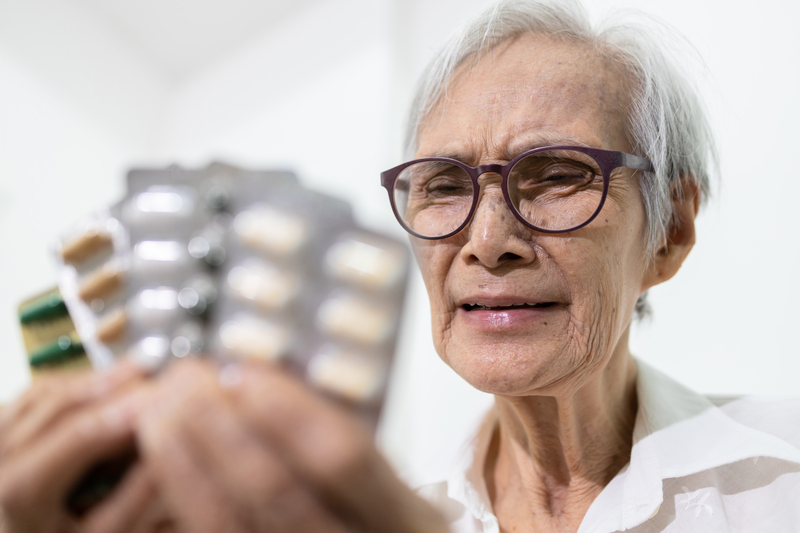This content is associated with The Open University's Health and Social Care qualifications.
In addition to that, we
may already know that as we grow older, we are at higher risk of having
multiple long-term health conditions, which we call polymorbidity. This often
leads to the need to take several different medications in one to treat each
condition (what we call polypharmacy). With all age-related changes that might
be already happening in our body polymorbidity and resulting polypharmacy may
be something our body finds difficult to deal with as we age.

The most important age-related changes for us to highlight today are decrease in basic metabolic rate and decrease in blood flow naturally occurring with ageing as well as kidney and liver mass decrease which further slows down the metabolisation and elimination of the medications we take.
This is closely linking to what effect medication(s) have on our bodies (Pharmacokinetics) and the way the body affects the drug journey (Pharmacodynamics). Also, the way our body deals with medications follows the cycle of Absorption, Distribution, Metabolism and Elimination.
Absorption is usually not hugely affected by ageing, but what we need to be mindful of is how the drug is supposed to be taken (on an empty stomach, with food, morning, afternoon or evening, and whether it can it be taken with other drugs).
Distribution may be slightly affected by age-related processes and our already slowed basic metabolic rate and our decreased blood circulation.
Metabolism is very much affected by age-related changes on our basic metabolic rate and age-related changes on the liver, which is the main organ responsible for processing the medications we take. We need to be mindful that the ability of the liver to withstand stress and trauma (for example relating to shock state, acute illness and/or injuries) decreases as well with ageing which can make our liver more prone to not functioning optimally.
Elimination of medication via the kidney is a very much affected part of the drug journey in our body as we age. The kidney tissue tends to decrease, and the kidney is therefore prone to ‘shrinking’. Less of a working kidney means even more slowed down elimination of the drugs from our body and that puts us more at risk of possible severe drug side effects and possible toxicity (from drug-to-drug interaction) that may further affect the function of our other organs including our brain.
Dehydration makes our basic metabolic rate even slower in addition to all age-related changes, prolonging the negative effects medication has on our body if the medication stays in our bodies longer than necessary.
Not drinking enough liquids (you may wish to check the picture below for levels of dehydration) brings serious risks for our overall health and wellbeing.
The big risks are that we may feel dizzy, drowsy, sedated, weak and not keen to go out and walk as we might be rightfully afraid of falling over and getting injured. Unfortunately, when we lack exercise and when we might be dehydrated, we are at a higher risk of suffering side effects of medications, so the vicious circle continues.
In later life, we often see more falls, more injuries, immobilisation and hospitalisation and often loss of independence as a result of repeated falls. It is therefore very important to discuss with your GP, pharmacists and health visitors how the medication you have been prescribed makes you feel and whether the dose could be reduced or medication changed if taking it doesn’t make you feel well.
To sum up: the main aspects of taking medications as we get older is that ageing changes result in different responses to the same amount of the same medications we might have been taking already over our lifespan.
- Drugs take longer to act (if we take for example a painkiller for a headache, we may need to wait for a bit longer for the medication to take effect, compared to what we were used to when younger). We should always wait for the effect before we take more medication because we may think this one isn’t working. It is just taking longer to work.
- Drugs take longer to get out / get eliminated from our body as mentioned above.
What do we need to do to prevent side effects and toxicity resulting from the effect of medications on our body?
- Follow The Five Pillars for Ageing Well (keep an eye on regular nutrition, hydration, physical activity, cognitive and social stimulation.
- Especially we need to make sure we are well hydrated (6–8 cups of water every day is close to ideal) while being careful not to drink too much tea/coffee/alcohol.
- Eat a healthy balanced diet.
- Exercise regularly. Exercise doesn’t need to be strenuous or long, every little helps. We can exercise 5 times a day for 5–10 minutes if we feel we cannot exercise 20–30 minutes in one go. It all adds up. WHO recommends 150 minutes per week as minimum. Let’s remember too that exercise can reduce the risk of many long-term conditions often occurring while ageing which might include heart disease, stroke, type 2 diabetes, dementia and some cancers.
Were you sitting for a while now? Perhaps you may wish to get up, drink a glass of water and take a short walk! Spending time outdoors has also huge benefits for our physical and mental health and wellbeing. You might be interested in short – public facing articles listed below and OU & Parks Trust YouTube Channel.




Rate and Review
Rate this video
Review this video
Log into OpenLearn to leave reviews and join in the conversation.
Video reviews